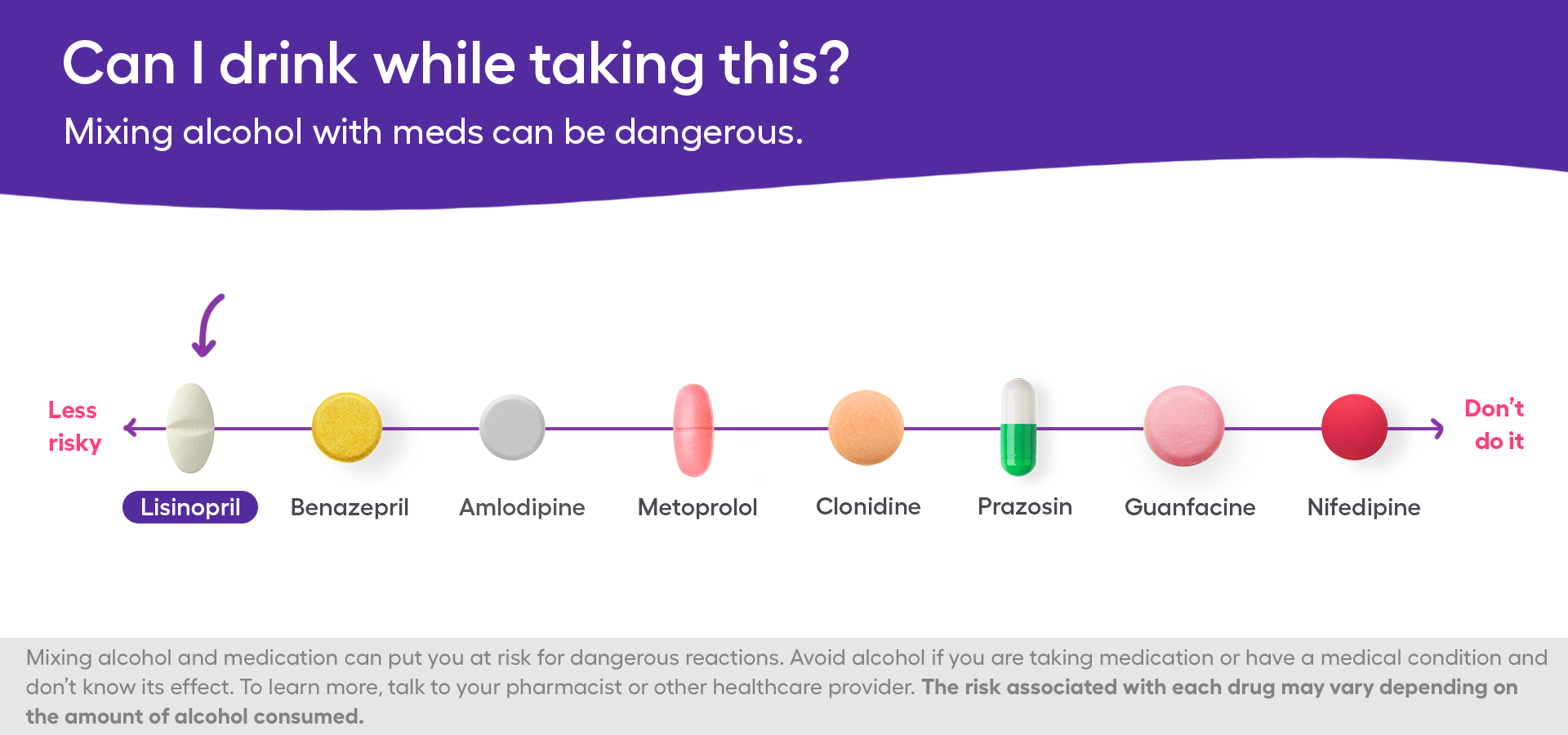Key takeaways
Drinking alcohol while taking lisinopril can cause adverse effects, including dangerously low blood pressure, dehydration, headaches, and nausea.
However, some people may be able to have one to two drinks a day with minimal side effects.
Always consult your healthcare provider before drinking alcohol while taking lisinopril.
Lisinopril is a common medication used for managing high blood pressure (hypertension) and heart failure. Healthcare providers also prescribe lisinopril to improve survival after a heart attack. It’s usually taken daily, on a long-term basis, to manage symptoms. If an evening glass of wine or happy hour with friends was part of your routine before being diagnosed, you may be wondering, is it ever safe to drink alcohol while taking this prescription?
It depends—on the amount of alcohol you consume and the side effects you experience. Combining lisinopril and alcohol can cause adverse reactions such as dehydration and nausea. On top of that, alcohol can make it harder for the medication to do its job. However, many people may be able to drink in moderation. Here’s what you need to know.
What are the risks of mixing lisinopril and alcohol?
There are risks of mixing alcohol with any medication. How severe the risks are varies depending on how much you drink, how alcohol affects you, and the side effects you experience from the medication. You may respond differently than another person taking the same dose and drinking the same amount.
Many of the side effects of lisinopril overlap with the risks of drinking alcohol. When combined, these risks may be amplified. Mixing lisinopril with alcohol can be dangerous but isn’t usually directly life-threatening. You might encounter anything from a single severe side effect to a few mild ones that are manageable. Individuals with heart conditions or liver and kidney problems should use extra caution. These are just some of the potential adverse effects of combining alcohol and lisinopril.

Lowered blood pressure
Lisinopril is an angiotensin-converting enzyme (ACE) inhibitor used to treat hypertension. It blocks the action of the angiotensin-converting enzyme, which is responsible for producing angiotensin II, a substance that narrows blood vessels and increases blood pressure. By blocking this enzyme, lisinopril helps blood vessels relax and widen, improving blood flow and lowering blood pressure.
Drinking alcohol can also lower your blood pressure. When combined, this effect may become dangerous, leading to dizziness, lightheadedness, fainting, or even shock. Your healthcare provider may recommend monitoring blood pressure regularly while on this medication because sudden drops can trigger severe health problems.
Increased risk of dehydration
Alcohol is a diuretic, meaning it removes water from your body. Lisinopril can suppress the feeling of thirst, which may cause dehydration if you don’t drink enough water. Therefore, combining the alcohol and lisinopril may increase the risk of dehydration. Symptoms might include dry mouth, thirst, and reduced urine output. Drinking plenty of water may help.
Kidney problems
Lisinopril affects how the kidneys filter blood, and drinking alcohol can strain them further. Together, they might increase the risk of kidney disease or other kidney problems. Signs include changes in urine color or frequency and back pain. Regular check-ups with a healthcare provider may help detect issues early.
Liver problems
Alcohol consumption may harm the liver over time. In addition, liver failure has been reported in people taking lisinopril. When alcohol is combined with lisinopril, the risk of liver problems may increase, especially over time with consistent use. Symptoms may include fatigue, jaundice, and stomach pain. This combination may also worsen existing liver damage or lead to new problems with liver function.
Heart palpitations
Mixing alcohol and lisinopril may lead to irregular heartbeats or palpitations, sensations in which your heart feels like it’s pounding, fluttering, or beating irregularly. If you experience persistent palpitations, seek medical attention.
Increased risk of falls and injuries
The combined effects of alcohol and lisinopril may increase the risk of falls and injuries. Dizziness, lightheadedness, and impaired coordination are all potential factors that can cause falls. These incidents can lead to broken bones or more serious injuries, particularly in older adults. Be watchful of your surroundings and avoid excessive alcohol consumption to help manage the risk.
Headaches
Both lisinopril and alcohol may cause headaches. When taken together, headaches may become more frequent or severe. Staying hydrated and limiting alcohol intake may help reduce this discomfort. If headaches persist, consult a healthcare provider. They can adjust medication or offer additional treatment options to alleviate discomfort.
Nausea
Alcohol irritates the stomach lining, leading to nausea, indigestion, and stomach discomfort. Nausea is also a potential side effect of ACE inhibitors like lisinopril. Therefore, drinking alcohol on lisinopril may increase this side effect. Symptoms may include vomiting or a general feeling of nausea. Eating smaller meals and avoiding heavy drinking may help manage these symptoms.
Flushing
Flushing, or redness of the skin, can occur when mixing lisinopril with alcohol. This happens because both substances affect the body’s circulatory system. Flushing is usually harmless but can be uncomfortable. Limiting alcohol intake may reduce the likelihood of flushing.
How much alcohol can you drink with lisinopril?
Much of the research on mixing blood pressure medications and alcohol relates to binge drinking. It’s unknown how having one to two drinks occasionally will affect any given person—depending on your response to alcohol and your response to the medication. However, for many, the risk of moderate alcohol consumption (one drink a day for women and two drinks per day for men) is likely low.
In general, limiting your alcohol intake reduces potential risks. For some, this might mean avoiding alcohol altogether while taking lisinopril, especially if you take a higher dose of lisinopril or have certain health conditions. Always consult a healthcare provider to determine what is safe for your specific situation.
How long after taking lisinopril can you drink alcohol?
Lisinopril has a half-life of around 12 hours. The half-life is the time it takes for the amount of the drug in your blood to reduce by half. To fully clear lisinopril from your body, it generally takes around five half-lives, which is about 60 hours. That means waiting two to three days after your last dose before drinking alcohol to make sure lisinopril is out of your system.
Your healthcare provider can offer advice based on your overall condition and may suggest a different waiting period.
Alcohol and other blood pressure medications
Mixing alcohol with blood pressure medications other than lisinopril can lead to harmful effects. Alcohol can interact with beta blockers, alpha blockers, diuretics, angiotensin II receptor blockers (ARBs), and other ACE inhibitors.
When these drugs are combined with alcohol, you may experience an increased risk of dizziness and fainting. Mixing alcohol with a blood pressure medication might also reduce the effectiveness of the medication and make it harder to maintain the right blood pressure levels. For those with substance use disorder, it may be important to find a detox program or seek medical advice to reduce potential risks and adverse effects.
Blood pressure medications affected by alcohol
Examples of blood pressure medications that may interact with alcohol include the following:
- ACE inhibitors, such as Vasotec (enalapril) and Lotensin (benazepril)
- Alpha blockers, such as Cardura (doxazosin), Hytrin (terazosin), and Minipress (prazosin)
- Beta blockers, such as Tenormin (atenolol), Lopressor (metoprolol tartrate), and Inderal (propranolol)
- ARBs, such as Diovan (valsartan), Cozaar (losartan), and Avapro (irbesartan)
These may not be the only blood pressure medications that interact with alcohol. Always consult a healthcare provider about any medications you take, including prescription drugs, over-the-counter medicine, and herbal supplements, before considering drinking alcohol.
The bottom line: Mixing alcohol and lisinopril has side effects
Drinking alcohol while taking lisinopril may cause several health risks. Alcohol can increase lisinopril’s blood pressure-lowering effects, causing dizziness, lightheadedness, and fainting. Combining alcohol with lisinopril may also worsen side effects such as headaches and dehydration. For these reasons, it is generally advised to avoid or limit alcohol consumption while on lisinopril.
- Zestril highlights of prescribing information, U.S. Food and Drug Administration (2017)
- The diuretic action of weak and strong alcoholic beverages in elderly men: A randomized diet-controlled crossover trial, Nutrients (2017)
- Lisinopril, LiverTox (2018)
- Drink alcohol only in moderation, U.S. Department of Health and Human Services (2024)




